Yuliya Olkhovska endured detention by Russian military forces, spent seven months under occupation, and briefly left for personal reasons but returned to Melitopol due to family circumstances. However, she couldn’t bear to live under occupation again. Now, Yuliya works in the liberated areas of Ukraine, sharing the stories and daily lives of Melitopol residents who await the liberation of their city.
Enemy tanks were already seen on February 24.
The first half of February 24 remained in Yuliya’s memory as a relatively ordinary but tense workday. If someone had told her she would witness the “Russian world” in just a few hours, she would hardly have believed it.
Olkhovska worked for the mv.org.ua website, writing about the city’s life and covering news. Early in the morning, like her colleagues, she heard explosions in Melitopol, and the windows rattled. As it later turned out, it was a missile attack. All the office employees gathered at the office at the start of the workday. Management suggested that everyone go home, but everyone decided to stay and continue working. Correspondents divided topics among themselves: ATMs, gas stations, pharmacies, and stores. Yuliya went to check the condition of the shelters.
— I walked through the courtyards of apartment buildings, asking passersby to show me where their bomb shelter was, inquiring if they knew who had the key, — Yuliya recalls. — The situation was far from joyful. Most residents regarded me as somewhat irrational. Some knew the location of the shelter but didn’t know who had the key. Some said, ‘The key is with the building manager, but I’ve never been there.’ Some shelters were open but turned out to be just basements and neglected ones. I managed to find the only shelter that met the standards, and the residents of the building knew how to access it.
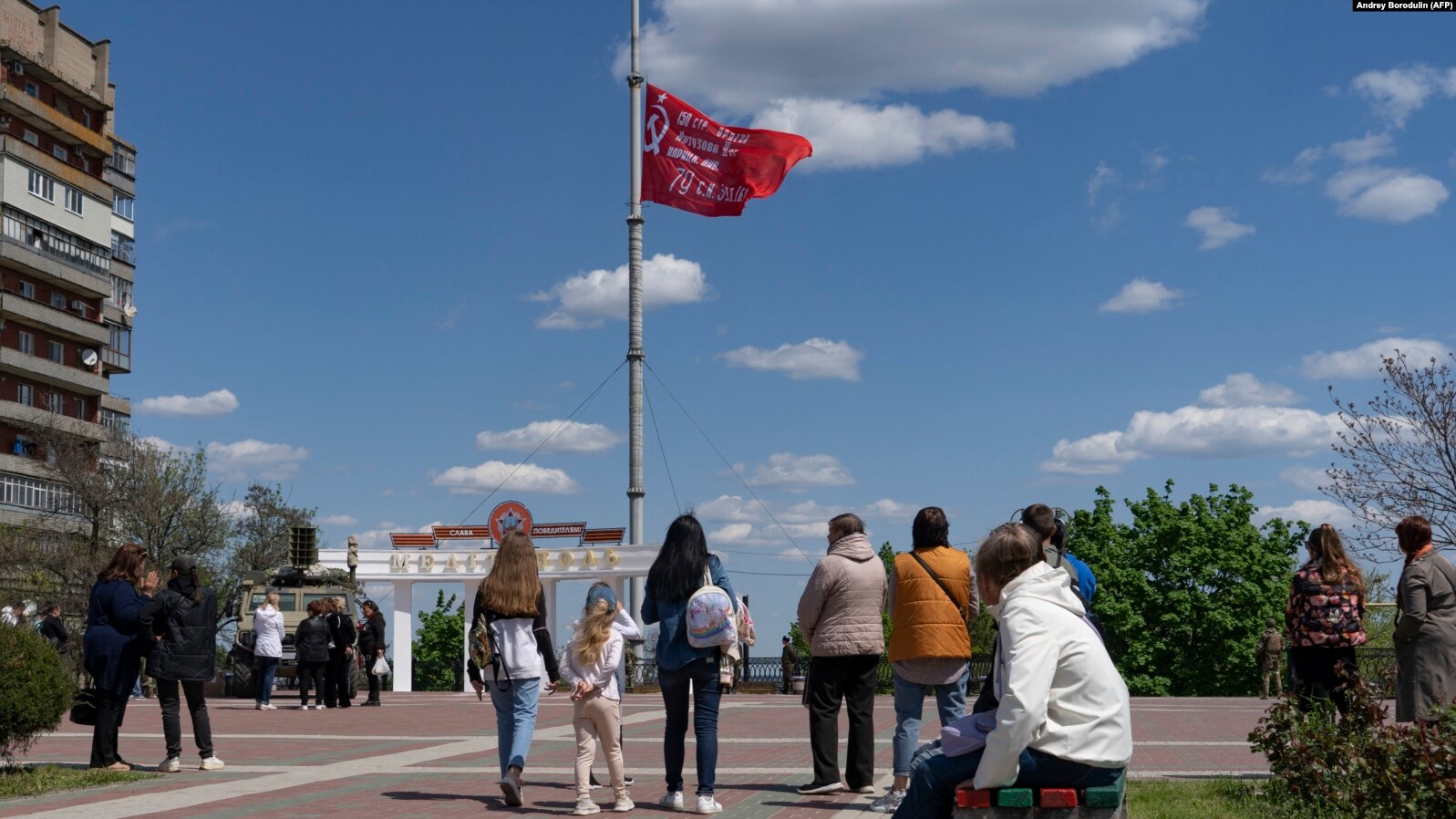
After posting the report on the website, the journalist headed back to work. On her way, she stopped by the Central Market to buy lunch. Suddenly, she overheard alarming information from a vendor.
— It seems that in the village of Yakymivka, about 27 kilometers from Melitopol towards Crimea, Russian flags are already flying over the local administration and police department. I was very angry! I still couldn’t believe that war had come to our doorstep. I started arguing with the woman, demanding that she not spread rumors… However, upon returning to the office, I decided to verify this information. The driver and I got into the company car and drove to Yakymivka. We didn’t even have time for lunch.
In Yakymivka, the editorial team saw with their own eyes that Ukrainian flags were still in place. However, as they later found out, this trip within their homeland was just the beginning.
— We wondered where these rumors came from and decided to go further, to the village of Novooleksiivka, 75 kilometers from Yakymivka (which is in Kherson region). We called our director, and she supported the idea, with the condition that we would be cautious. So, we went.
At the border between Zaporizhia and Kherson regions, they encountered a column of Russian tanks.
— As we climbed a hill, we saw tanks descending towards us. It was impossible to turn back or escape. We pulled over to the side of the road, where several cars were already parked. The tank column was moving at a pedestrian’s pace, surrounded by armed soldiers. They slowly approached us. We asked what we should do. They said, ‘Go about your business as usual, we’re coming to you in peace.’ I even asked, ‘Will you let us through when you return in two hours?’ The soldier looked at me and replied something like, ‘We’ll see each other again.’ So, we continued driving, coming up with the excuse that we needed to go to Henichesk, which is near Novooleksiivka. In reality, the ‘peace’ that the Russians were bringing became evident as we exited the highway towards Henichesk. There, our armored personnel carrier was on fire, and the bodies of our guys were lying around, — our interviewee recounts.
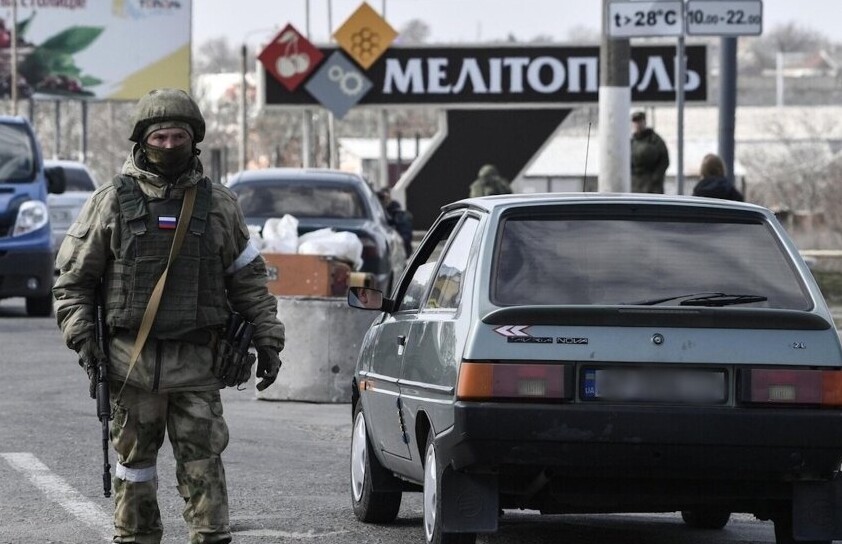
Upon reaching Henichesk, which was already fully occupied by the Russians, the residents of Melitopol witnessed a significant presence of enemy military equipment and troops. Near the police station, the editorial driver was ordered to turn, indicating that there were still bodies of local residents who had perished while resisting.
The newsroom was found closed, but the website was still operational.
After two hours in Henichesk, the journalist and the driver opted to return home due to the approaching evening. They hit the Melitopol highway, where they encountered a huge convoy of Russian military vehicles coming from Crimea toward their city. Despite prior assurances, the editorial staff was denied access to the highway, forcing them to backtrack to Henichesk to find overnight accommodations, which proved difficult. The next morning, they reattempted to access the highway, and what they witnessed left Yuliya even more astonished.
— The column of heavy equipment seemed endless, — she recounts. — Tanks, self-propelled artillery units, and trucks with people were moving in two or three rows. Furthermore, some vehicles were traveling on dirt roads alongside the asphalt or through fields next to the forest strip. Because this equipment was ‘analog-era,’ breakdowns were frequent – something would stall, or a wheel would come off. The procession moved at a turtle’s pace. Following the military’s instructions, we had to drive within this column; otherwise, it was impossible. We took over four hours to traverse 50-60 kilometers.
At a checkpoint, the occupiers redirected Olkhovska and her driver to Yakymivka instead of allowing them to proceed to Melitopol. In Yakymivka, which had experienced a two-day power outage and poor communication, locals recognized their “MV” marked car and offered them coffee. They couldn’t return home on February 25, and at the next checkpoint, the Russians confiscated their phones at gunpoint and ordered them back to Yakymivka.
They finally arrived in Melitopol on the fourth day.
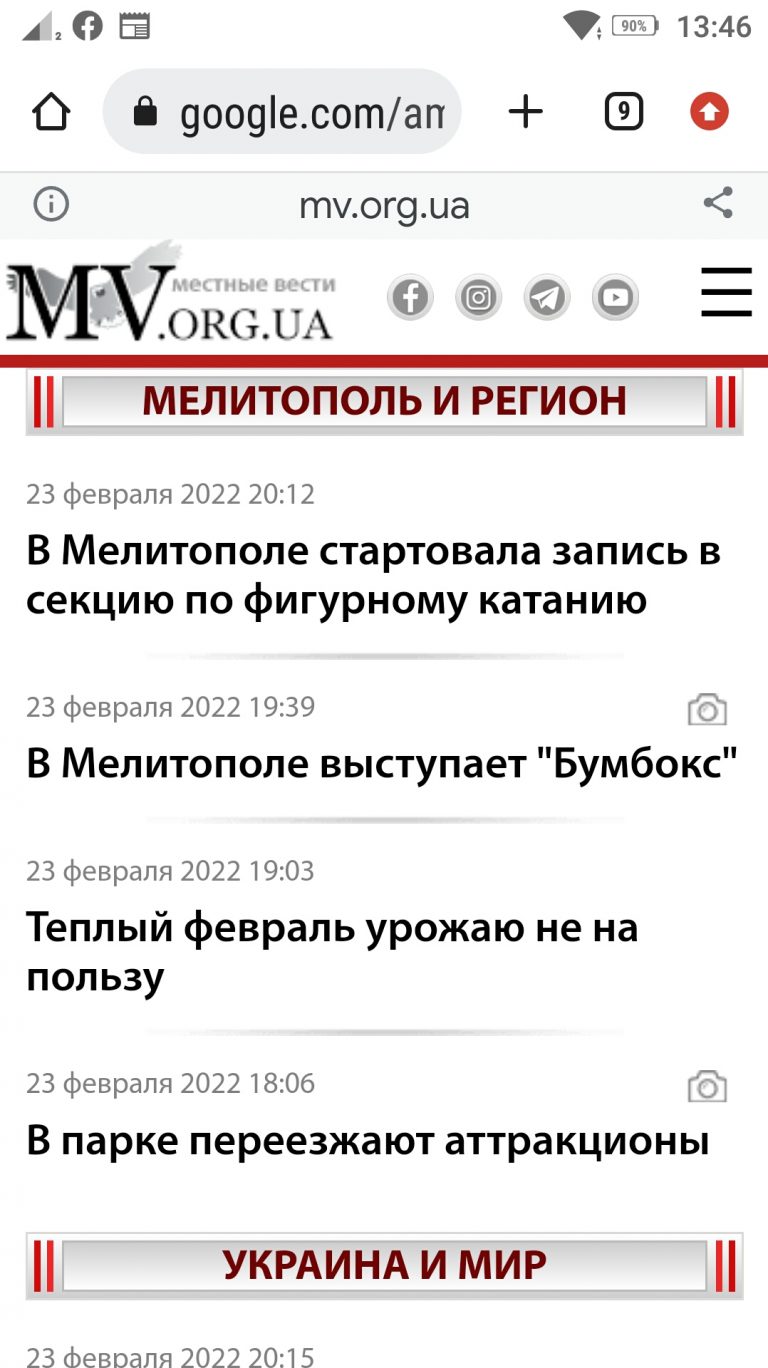
— I can’t reveal the details of how we managed this for now, but I will definitely express my gratitude to the kind-hearted people who allowed us to stay overnight and provided us with food after the war, — emphasizes Olkhovska.
During the occupation, the “MV” office remained closed, and the editorial team set up a post in the media holding’s courtyard since the city council building had been seized. They couldn’t access their office, but the website continued to operate. Journalists reported on events from their homes, maintaining an editorial stance that the town was occupied. They covered frequent protests where locals gathered under Ukrainian flags.
At first, activists attempted to reason with the Russians, then demanded they leave Melitopol, resorting to lying under their vehicles. However, the occupiers grew more ruthless, leading to kidnappings. The first abduction was Leila Ibrahimova, the director of a local museum and a prominent pro-Ukrainian activist, taken early on March 10 and released after half a day. Mayor Ivan Fedorov had a less fortunate fate, being kidnapped on March 11 and exchanged for nine Russian prisoners on March 16.
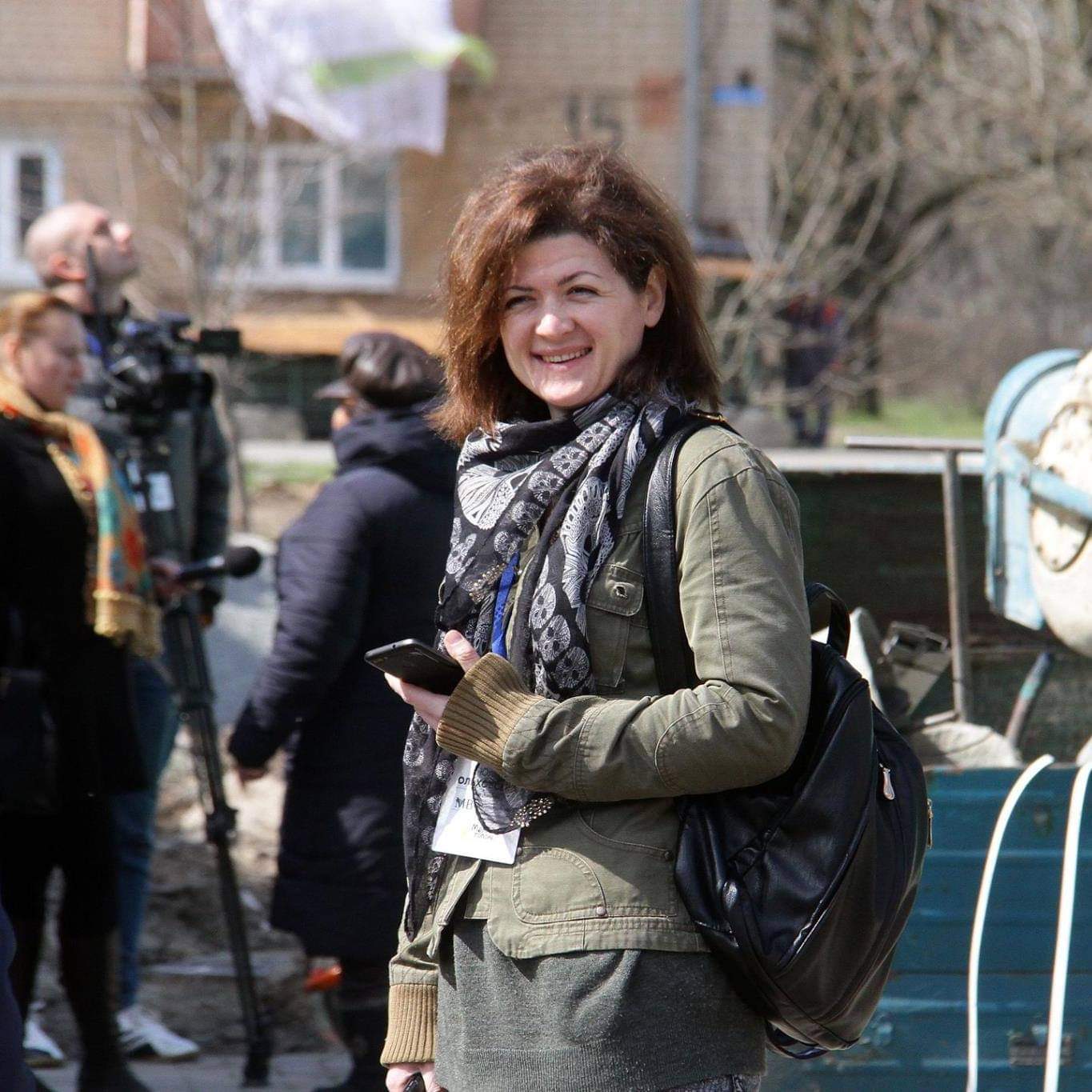
“At 5 AM, the occupiers came for me.”
On March 21, the “MV” editorial team stopped working, deleting all posts on mv.org.ua since February 24, 2022. “Melitopolskie Vedomosti” also halted publication. On the same day, Yuliya Olkhovska, along with two colleagues and media owner Mykhailo Kumok, were detained by the occupiers.
— At 5 AM, the occupiers came for me. We live in a suburban house. They entered our yard and knocked on the door. I opened it, saw armed individuals, and understood the situation. They were surprisingly polite and didn’t make threats. They claimed they only wanted to ‘talk’ but requested all our memory cards. They found an ‘ideologically incorrect’ image on my husband’s phone and asked him to delete it. Then, we left the yard in their company and got into an unmarked white minibus, heading to the office. Upon arrival, one of the soldiers radioed to confirm our presence and then went into the yard to retrieve the office key. So, they had the key – I won’t specify if it was for the old or new lock— Ms. Olkhovska explained. — Chaos awaited me in the office. Locks on the doors were broken, and CCTV cameras were dismantled. I managed to glimpse into my office, and everything was in disarray, even though it was never particularly orderly before. I can’t fathom what valuable items they may have found.
For about five hours, until roughly 11 AM, the occupiers questioned me extensively. They showed a keen interest in the grant programs frequently used by the media holding. They inquired about how the newsroom discovered grants, the application process, and who decided on publication topics. The most audacious offer from the occupiers was to collaborate with the journalist.
— They tried to convince me that they came here for good and that I should accept it. They promised me the opportunity to ‘objectively cover reality,’ to ‘tell people the truth’… Of course, there was no way I could agree! — the journalist exclaims.
On that day, Yuliya and her colleagues were released. However, to ensure the safety and freedom of the media workers, the management of “MV” decided to suspend the operation of their media. Working underground for journalists meant exposing themselves to great risks, as they all continued to live under occupation.
In addition to memory cards, Olkhovska had her home computer’s processor seized during her arrest. Although it was returned, she refrained from using it due to concerns about potential surveillance. It became evident that the occupiers had comprehensive lists of local pro-Ukrainian activists, journalists, ATO [Anti-Terrorist Operation – Ukrainian government’s military campaign against separatist and terrorist groups in Eastern Ukraine] participants, and police officers from the outset, complete with their addresses and phone numbers.
— Where did they get these lists? For Melitopol, this is an interesting question. This story seems to have been prepared well in advance, — Olkhovska concludes.
Since the media had stopped operating, there were no salaries. Initially, the company provided financial assistance to its employees for a few months. Later, Olkhovska and her family relied on their savings. Stable income only returned on the free territory. She made two trips there, the first in the summer with her daughter, a student. They left Melitopol because of her studies, and it was generally deemed unwise to stay in the city. This happened in August and cost a relatively small amount. They traveled with a volunteer carrier who used the earnings to buy medicine for locals. However, leaving Melitopol for Zaporizhzhia (125 km away) at that time cost around UAH 5,000. At the checkpoint during departure, the occupiers thoroughly inspected belongings, particularly focusing on phones, laptops, and tablets, checking their contents selectively but meticulously.
— I settled my daughter in the free territory, but family circumstances forced me to return home. I’m still not sure if it was the right decision to go back, — the journalist muses. — When I was in occupation, it was very difficult, but I got used to it. But when I left for free Ukraine, where I keenly felt the difference, and then returned to occupation, it was simply unbearable. I came back, stayed for two weeks, and my husband said, ‘I can’t bear to look at you; I see that you can’t live here. Go to free Ukraine. You’ll come back after we win.’
In late September, Yuliya left Melitopol before mandatory exit passes were imposed. She registered as an internally displaced person in Ukrainian-controlled territory and resumed receiving a salary with the help of the “Center for Investigative Journalism.” The National Union of Journalists of Ukraine (NUJU) provided her with a laptop since she had lost her working tools.
— Now I can work fully. Thanks for that to the Union! — Olkhovska rejoices.
Yuliya is listed as a victim in a criminal case of abduction. It’s difficult to say how quickly the investigation will progress. In projects by the “Center for Investigative Journalism,” her publications about the occupied Melitopol region are released under a pseudonym. However, Yuliya is eagerly awaiting the moment when she can work openly and, most importantly, embrace her family at home without any fear. This will only be possible after our victory.
This series, titled Executed Free Speech, is created as part of a project Drawing Ukrainian And International Audience’s Attention To Serious Violations Of Human Rights And Crimes Against Journalists And Mass Media By The Russian Federation, which is performed by the National Union of Journalists of Ukraine, with support from the Swedish non-profit organization Civil Rights Defenders.
JOURNALISTS ARE IMPORTANT. Stories of Life and Work in Conditions of War is a cycle of materials prepared by the team of the NUJU with the support of the Swedish human rights organization Civil Rights Defenders.
#CRD

 THE NATIONAL UNION OF
JOURNALISTS OF UKRAINE
THE NATIONAL UNION OF
JOURNALISTS OF UKRAINE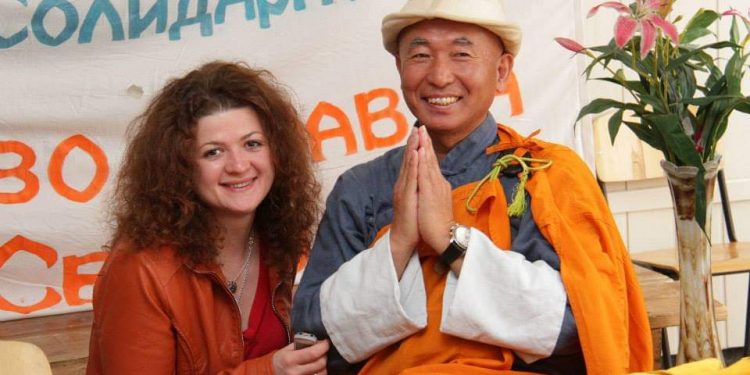
















Discussion about this post